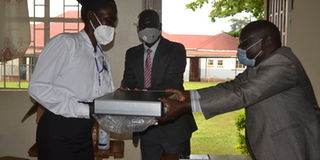Prime
Shortage of eye doctors hits Uganda

Ms Limlim Teddy, a nurse and one of the students from Nabilatuk District, receives eye diagnostic equipment from Mr Sam Ajwika Nason, the principal of Ophthalmic Clinical Officers Training School in Jinja City at the weekend. PHOTO/DENIS EDEMA
What you need to know:
- The school that trains eye specialists has continued to grapple with limited students due to lack of infrastructure and equipment.
Uganda has been hit by a shortage of eye doctors (ophthalmologists) in hospitals across the country, according to reports.
Dr Anthony Wani, the country director of Sight Savers International Uganda, a charity organisation working to prevent avoidable blindness, support equality for People With Disabilities and advocate for change, told Daily Monitor at the weekend that the country only has 40 ophthalmologists, with some referral hospitals not having any.
He said Vision 2020 aimed at increasing human resource capacity of the eye specialists by 10 Ophthalmic Clinical Officers (OCOs), but it is far from being achieved.
“With Uganda’s population that is estimated at 40 million, that means one ophthalmologist handles 1 million patients and about 200 OCOs, which is a big challenge,” Dr Wani said.
The eye specialist, who was handing over assorted eye-training equipment worth Shs20m to eight select students from Karamoja Sub-region undergoing a three-year training at the Ophthalmic Clinical Officers’ Training School in Jinja City, appealed to the government for financial support.
The principal of the institute, Mr Sam Ajwika Nason, said the school was first established in Mulago National Referral Hospital in 1989 under the Ministry of Health before it was transferred to Jinja Regional Referral Hospital in 2001.
He, however, noted that the school continues to grapple with limited students due to lack of infrastructure and training equipment, despite being a hands-on profession.
“This is the only ophthalmic training school in the entire country, but it only has 120 students, all of whom we cannot accommodate and conduct classes at once, leaving the other section to learn from home,” Mr Ajwika said.
It is on this background that once students qualify and are posted to government facilities, they find no (ophthalmic) equipment, which is too expensive to be acquired on individual basis.
The outgoing head of the ophthalmology department at Jinja Hospital, Dr Alex Wasomoka, who has been promoted to assistant commissioner in the Health ministry, said Busoga Sub-region has many cases of eye problems, which he attributed to lack of hygiene.
He singled out cataracts among the elderly, diabetic retinopathy eye problem in Persons with Diabetes, glaucoma in people above 40 years, and trachoma as those that need professional eye specialists to conduct surgery.
Ms Limlim Teddy, a nurse and one of the students from Nabilatuk District, said she took “a bold decision” to enroll for the training after seeing many patients flock the health centre for services yet there was no trained person.
A 2020 report by eye specialists Dr Joseph Magyezi from Ruharo Eye Centre, Ruharo Mission Hospital, Mbarara and Dr Simon Arunga from Mbarara University of Science and Technology, there is a need for urgent action to improve accessibility to eye care.
“Uganda’s population of 40 million is served by just 40 ophthalmologists and half of them work in the capital city, Kampala,” the report reads.
Prevalence
As the country celebrated World Sight Day in Moroto District on October 14, it was identified that poor hygiene, traditional beliefs and poor infrastructure were some of the causes of blindness in Karamoja Sub-region. According to the Random Assessments of Avoidable Blindness Surveys for 2012 to 2014, Uganda had an estimated 2.5 million people diagnosed with moderate and severe impairment.
ALSO READ




